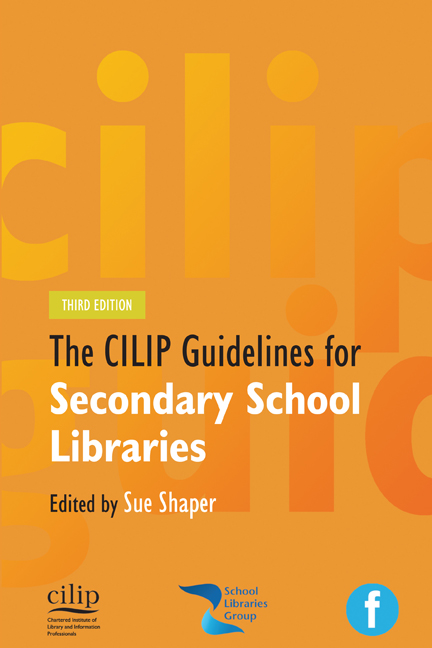Book contents
- Frontmatter
- Contents
- Foreword
- Key recommendations
- Introduction
- Notes
- Abbreviations
- 1 The school librarian and learning: CILIP's vision
- 2 Staffing and management
- 3 Policies and planning
- 4 The library environment
- 5 Management of learning resources
- 6 Information literacy
- 7 Developing students as readers
- 8 Marketing, promotion and advocacy
- 9 Evaluation
- 10 Partnerships
- References
- Appendices
- Index
8 - Marketing, promotion and advocacy
Published online by Cambridge University Press: 08 June 2018
- Frontmatter
- Contents
- Foreword
- Key recommendations
- Introduction
- Notes
- Abbreviations
- 1 The school librarian and learning: CILIP's vision
- 2 Staffing and management
- 3 Policies and planning
- 4 The library environment
- 5 Management of learning resources
- 6 Information literacy
- 7 Developing students as readers
- 8 Marketing, promotion and advocacy
- 9 Evaluation
- 10 Partnerships
- References
- Appendices
- Index
Summary
CILIP recommends that the librarian is proactive in marketing and promoting services, resources and library use. This means that:
• the librarian regularly gathers information on users’ needs and compares these with service provision
• the librarian actively encourages use of the library and its resources
• the librarian champions the role of the library in supporting teaching and learning.
Introduction
‘Marketing’ is frequently associated with promotional activities and advertising but, in reality, it is a much broader management process which includes identifying, anticipating and satisfying customer requirements (Chartered Institute of Marketing, 2000). Librarians must continually ensure that their service is relevant to the needs of the school community and that it is promoted effectively to appropriate audiences and stakeholders, both existing and new. Using a marketing approach enables the librarian to be both genuinely responsive to needs and capable of anticipating and satisfying future requirements.
The marketing mix
There are key factors that determine users’ perceptions of a service and that can be controlled to manage demand. These are referred to as the ‘marketing mix’ and are the basic considerations of any marketing strategy. A school librarian must honestly consider each of these in relation to the needs of all potential users to successfully market the library or a particular project. The ‘7 Ps’ of marketing (Chartered Institute of Marketing, 2000) are:
Product. The range, quality and features of the services offered, including activities such as study support and reading groups, and the extent to which these reflect the needs of users and nonusers.
Price. While the school library may be free at the point of access, there may be costs associated with its use which determine demand. For example, fines and charges for lost or damaged items can be a powerful deterrent to some users. On the other hand, sharing the costs of specific resources, such as online periodicals, with individual departments can have the effect of making them value the resource and be more determined to increase its use.
Promotion. Communication with all potential users through use of the school website, intranet, VLE, magazines, podcasts, presentations in assembly or to staff, governors’ or management meetings. Different audiences require different styles of communication and different messages.
- Type
- Chapter
- Information
- CILIP Guidelines for Secondary School Libraries , pp. 69 - 78Publisher: FacetPrint publication year: 2014



